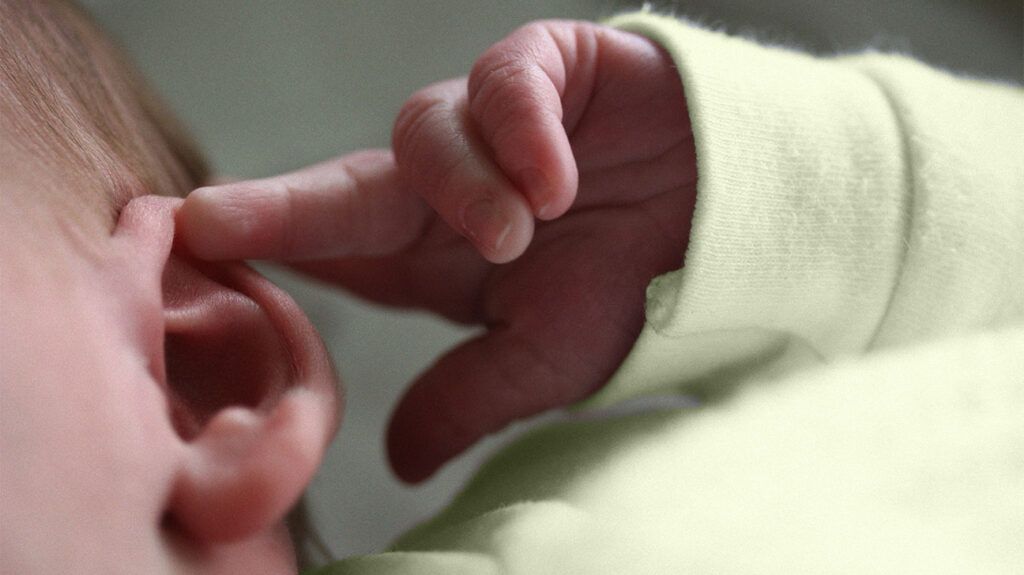Tinnitus is the perception of sound in the absence of any external noise. In some cases, tinnitus may occur as a result of an underlying medical condition. Some of these conditions may be hereditary.
People often describe tinnitus as a ringing sound in their ears. However, it may also present as a roaring or buzzing sound. Both adults and children can have tinnitus. For some people, tinnitus will go away or improve over time. For others, it may worsen.
This article describes whether tinnitus is genetic and outlines some conditions that may cause it. It also discusses if people can be born with it, other causes of tinnitus, and tips for managing the condition.

A
According to the review, tinnitus can also occur as a result of certain underlying health conditions. Several of these conditions can be hereditary, meaning they may be passed from individuals to their genetic offspring.
Meniere’s disease
As the American Hearing Research Foundation (AHRF) explains, Meniere’s disease (MD) is a disorder of the inner ear.
It can cause tinnitus, as well as:
- muffled hearing
- vertigo
- balance problems
According to the AHRF, experts have not yet reached a consensus regarding the cause of MD. However, the condition sometimes runs in families, suggesting a possible genetic link.
Learn more about Meniere’s disease.
Lesions of the eighth cranial nerve
The cranial nerves are nerves that connect the brain to different parts of the body. The eighth cranial nerve
A lesion on the eighth cranial nerve may cause tinnitus. According to a
Non-hereditary causes of a lesion on the eighth cranial nerve include:
- direct trauma
- injury to a blood vessel
- infection
- tumor
Hypertension
A
According to the
Learn more about hypertension.
Diabetes
Diabetes is a condition involving chronic high blood sugar levels.
A
The
It is not possible to definitely state whether a person can be born with tinnitus. This is because tinnitus is a subjective experience that babies and very young children would be unable to communicate.
Moreover, if a child is born with tinnitus, they may come to think of it as normal or may not
In theory, children with congenital hearing loss could experience tinnitus from birth, but it is not possible to know this for certain.
The underlying cause of tinnitus is not always known.
However, according to the
- exposure to loud noises
- hearing loss, often due to aging, or exposure to loud noises
- side effects from taking certain medications, such as:
- nonsteroidal anti-inflammatory drugs (NSAIDs)
- certain antibiotics
- antidepressants
- anticancer drugs
- anti-malaria medications
- blockages within the ear due to a buildup of earwax or fluid from an ear infection
- head or neck injuries affecting the ear, the brain, or the nerve that carries auditory signals to the brain
The NIDOCD also lists some less common risk factors for tinnitus. These include:
- Meniere’s disease
- temporomandibular (TMJ) disorders
- tumors, such as acoustic neuroma
- circulatory issues, such as:
- hypertension
- atherosclerosis
- blood vessel malformations, especially in blood vessels in or close to the ear
According to the American Tinnitus Association (ATA), while there is currently no cure for most cases of chronic tinnitus, treatments are available to help ease the perceived intensity of tinnitus.
These include:
- Hearing protection: Wearing hearing protection may help improve tinnitus in people with extreme sound sensitivity. However, since these devices block external noise, some people may find that their tinnitus becomes more noticeable. Some forms of hearing protection include:
- ear muffs
- earplugs
- canal caps
- Audiological treatment: Around 90% of people with tinnitus have some degree of hearing loss. Individuals with an underlying condition that affects their hearing or vestibular system may find that treating the condition helps improve their tinnitus. A specialist doctor called an otolaryngologist can help diagnose and treat such conditions. Treatment may include hearing aids or cochlear implants.
- Behavioral therapies: These therapies aim to change a person’s emotional reaction to tinnitus and are effective at relieving tinnitus-related stress, anxiety, and depression. People can receive individual or group therapy in person or online.
According to the ATA, a person should speak with a healthcare professional if their tinnitus lasts more than one week or if it is associated with any of the following symptoms:
- poor sleep
- lack of concentration
- mental health issues, such as depression and anxiety
A healthcare professional will work to diagnose the cause of the tinnitus and make a referral to an appropriate specialist. If they are unable to determine the cause, they may recommend that a person see an audiologist for a more thorough evaluation.
Tinnitus is the perception of sound in the absence of any external noise. Certain underlying medical conditions may cause tinnitus, and some of these may have a hereditary component. Examples include hypertension, diabetes, and congenital malformations of the eighth cranial nerve.
Although certain medical conditions may increase the risk of tinnitus, they are not the most common cause. Most cases occur because of exposure to loud noises. Other common causes include blockages within the ear canal, hearing loss, and medication side effects.
Anyone who experiences tinnitus for more than 1 week should speak with a healthcare professional to determine the cause. People should also consider seeing a healthcare professional if their tinnitus affects their sleep or concentration or triggers mental health issues, such as anxiety or depression.
